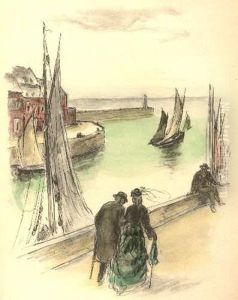Mirbeau Paintings
Octave Mirbeau was a French journalist, art critic, travel writer, pamphleteer, novelist, and playwright, who achieved fame through his scathing reports and essays that combined wit, satire, and an advocacy for social justice. His multifaceted career spanned various aspects of the arts and literature, contributing significantly to the intellectual and cultural discourse of his time.
Mirbeau was born on February 16, 1848, in Trévières, Calvados, in Normandy. His upbringing in a small provincial town would later influence his writing, which often depicted the hypocrisies and injustices of rural French life. Mirbeau studied at a Jesuit college and then at the Lycee Louis-le-Grand in Paris, experiences that left him with a lifelong disdain for traditional institutions and authority.
Beginning his career as a bon vivant in Parisian literary circles, Mirbeau initially wrote under pseudonyms and wasn't immediately successful. His early works were often ignored or dismissed. However, his fortunes changed with the publication of 'Le Calvaire' in 1886, which drew attention for its candid portrayal of the protagonist’s suffering and psychological turmoil. This was followed by 'L'Abbé Jules' (1888) and 'Sébastien Roch' (1890), both of which critiqued the repressive social and moral structures of the time.
Mirbeau's most renowned novel, 'The Torture Garden' ('Le Jardin des supplices'), published in 1899, is a dark exploration of human nature and the intertwining of pleasure and pain, considered scandalous and avant-garde at the time of its release. His novel 'The Diary of a Chambermaid' ('Le Journal d'une femme de chambre'), published in 1900, provided a critical examination of French society through the eyes of a resentful servant, exposing the decadence and hypocrisy of the upper classes. This work was later adapted into successful films by directors Jean Renoir and Luis Buñuel.
As an art critic, Mirbeau championed the works of the Impressionists, particularly Claude Monet, Camille Pissarro, and Auguste Rodin, at a time when they were not widely appreciated. His essays and articles were compiled into volumes such as 'Les Écrivains' (Writers) and 'Les Artistes' (Artists), demonstrating his broad range of interests and the depth of his cultural commentary.
Mirbeau was also involved in politics, ardently supporting Alfred Dreyfus during the Dreyfus Affair, a political scandal that divided France in the late 19th century. He was vehemently opposed to societal corruption, and his political writings reflect his commitment to anarchist and socialist causes.
Octave Mirbeau passed away on February 16, 1917, in Paris. His legacy is that of a complex figure who used his sharp wit and moral fervor to critique and confront the social ills of his time. His work continues to be studied and appreciated for its literary merit and its incisive criticism of societal norms.
